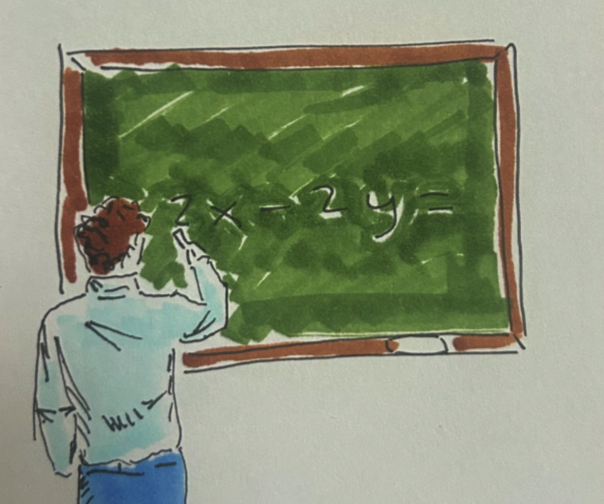A few weeks ago, I thought I had figured it all out. It was a Saturday afternoon, and I had an entire weekend ahead: perfect for catching up on assignments and prepping for exams. With no distractions and no obligations, I was sure that this stretch of time would finally push me ahead.
However, as I sat down to start, I gazed at my laptop screen, barely able to concentrate. Hours slipped by as I checked my email, scrolled through social media and did anything except the work I had planned. I realized that, in the end, all the time in the world wouldn’t matter if I didn’t know how to divide that time and focus.
Many high school students believe that more free time is the answer to their academic struggles. An unplanned weekend, an evening home alone or an extended study block typically seems like the ideal opportunity to finally check off that endless to-do list, to finally grasp that one tricky concept or to finally become a more disciplined, accomplished version of themselves.
This logic feels almost irrefutable. After all, shouldn’t more time lead to more productivity? However, a weekend “without plans” is exactly the cause of time management issues. More time, if not used effectively, dulls focus rather than sharpens it. In other words, what could have been a short burst of concentrated effort stretches into hours of aimless activity. Instead of working more efficiently, students fritter away hours, not making nearly as much progress as they could.
In high school, a time when academic pressure grows, working long hours to achieve academic goals leads students to sacrifice sleep. According to Pew Research Center, 68% of teens aged 13–17 feel pressured to get good grades, and 77% of high school students report a lack of sleep, despite the Centers for Disease Control and Prevention’s recommendation that teens get 8 to 10 hours of sleep each night. This chronic exhaustion contributes to increasing burnout, as students find themselves physically and mentally drained.
Despite the growing abundance of time management tools and productivity advice, students continue to battle the fatigue of meeting both their academic and social obligations.
One of the primary reasons — a reason that we often forget or ignore — is the fact that being provided with extra time often backfires by encouraging procrastination. Without the pressing urgency of a deadline, distractions multiply, and momentum to finish academic tasks, or any other task for that matter, fades. A task that could have been accomplished in an hour often expands to fill an entire day, and small, trivial activities take precedence, while the work that should be prioritized gets shoved aside.
I remember one weekend in particular when I had an entire morning free to work on a project. I told myself I’d start at 10 a.m., but then I decided to work on some other miscellaneous task with a less pressing deadline. I then pushed the more important project back to 1 p.m., then 3 p.m., and eventually told myself I’d do it by 6 p.m. The next thing I knew, I was out at dinner, and by the time I returned, I had only two hours before midnight to work on the project I had envisioned completing during the day.
By midnight, I realized I had sacrificed my sleep for this project, feeling the full weight of the guilt and stress I had built up all day. My lack of focus and procrastination had only made things worse, and I woke up the next morning without a clear plan. It was far from an ideal way to work. The quality of my project would have been much stronger with proper sleep, and I would have felt far less overwhelmed. Still, this cycle is all too familiar for many students who struggle with time management.
Many students believe that dedicating more time to a task automatically leads to better results, but when too much time is available, a sense of urgency fades, and the work becomes easier to delay.
The solution is not simply to block off longer periods for assignments or study sessions, but to focus on clarity. Students must ask themselves: What exactly am I trying to accomplish, and why? Without a clear purpose, time quickly slips away as distractions creep in without notice.
A study from Stanford University found that multitasking, a common side effect of unstructured time, can slash productivity by up to 40 percent. Similarly, research from the University of Washington showed that students who practiced focused, time-limited study sessions retained information more effectively than those who studied for longer stretches without a clear structure.
In the end, students shouldn’t focus on adding more time; they must think about using time with sharper purpose, deeper focus and changing habits that waste energy and attention.
Some simple strategies can make a major difference. For example, instead of assigning themselves a vague goal like “study for math,” students should set specific, achievable objectives, such as “complete five practice problems” or “review one chapter of notes.” Breaking larger assignments into smaller, timed segments, such as working in 25-minute bursts with five-minute breaks in between (the Pomodoro technique), can also help maintain momentum without leading to burnout.
Students can also benefit from setting external accountability measures, like sharing goals with a friend or parent or using apps that block distracting websites during work periods, such as Forest, StayFocusd and Clearspace. Even writing down a daily to-do list with only three prioritized tasks forces clarity and prevents students from confusing “being busy” with making real progress.
Most importantly, students should resist measuring success solely by how long they worked. Instead of believing that logging endless hours to complete a specific task, students need to build intentional, effective habits. Making each hour matter, rather than accumulating more of them, is ultimately what allows students to move forward with greater confidence and less stress.

























